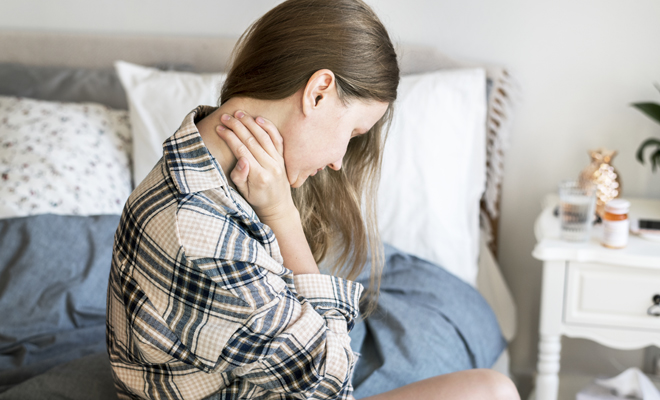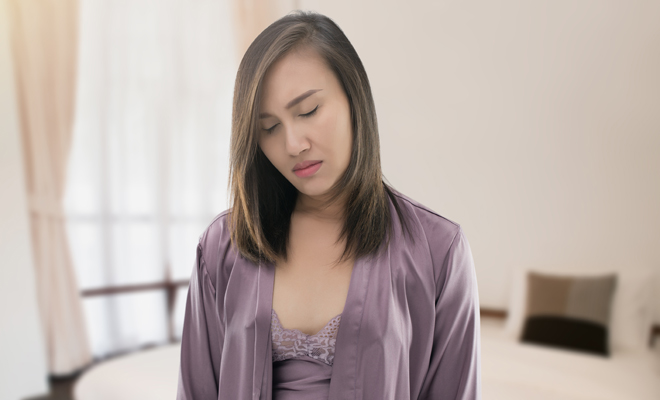It’s not all in your mind; it’s not all emotional pain. Anxiety also wreaks havoc on the body and the neck area is one of the first affected. The problem is that when we go to the doctor for terrible neck and shoulder pain, the first thing they do is treat the symptoms without getting to the cause of the problem. Some medication for pain and inflammation and you continue with your life and with your anxiety, increasing the emotional load and bodily tension. Do you know how to relieve anxiety tensions? We tell you!

Why Anxiety Causes Neck and Shoulder Pain?
Anxiety is not only a psychological condition; it also impacts our physical state. One of the first consequences of suffering from an anxiety disorder is seen in the neck and shoulders. Tension, pressure, stiffness, punctures and, above all, pain is the shares with stress in this area of the body. And little by little it will affect the entire back with pain and the appearance of contractures.
Most people who suffer from anxiety report this pain in the neck and shoulders, a problem that can be combined with dizziness. But why does anxiety affect this area so much? It is necessary to understand the mechanism of anxiety. What happens when you face a danger? Your whole body tenses or stiffens ready to respond to that danger, maybe fight or maybe flee.
Under normal conditions, that danger would pass in a few minutes and the body would return to its relaxed position. There is no longer any risk, there is no longer any threat and your body can relax. However, anxiety becomes a disorder precisely because the feeling of danger does not disappear, which is why you keep your body alert at all times. And from there to the appearance of the famous muscular pains, it takes a very short time because it is a rather unnatural posture. Now it’s time to solve this new problem of neck and shoulder pain, right?
How to relieve neck and shoulder pain from anxiety?
We find ourselves again with the debate of the first visits to the doctor when it comes to anxiety. We usually go for specific ailments, in this case tension in the neck and shoulders, and it is not uncommon to leave the office with some anti-inflammatory medication or analgesic cream. What do we get with this? Relieve pain, reduce symptoms, but we are not doing any intervention on anxiety, which is the real problem.
Indeed, painkillers and anti-inflammatories will manage to relieve pain in both the neck and shoulders. A few visits to the physical therapist will also make a significant improvement, but if we continue to treat only the symptoms, the anxiety will run its course and the problems will return.
We have already said many times that the best treatment for anxiety is psychological therapy. And let us stress once more, because it’s the only way to avoid neck and shoulder pain and the many other consequences of anxiety disorders. Getting, learning to manage anxiety so that the mind does not perceive a constant danger on a day-to-day basis.
The intermediate solution, since it is urgent to solve the problem of muscle pain, rather than relaxation exercises (which over time end up becoming an avoidance of anxiety that increases the fear of the symptom, resulting in fight or flight), is much better meditation or mindfulness. With this, unlike relaxation that only seeks to reduce the symptom, you work on the acceptance of pain and anxiety, with full attention from this acceptance. In this way, when the body observes that we accept anxiety and that nothing serious is happening, the brain gives the order to lower the activation of the sympathetic nervous system that activates the fight or flight mode, which stresses our body.
It is also very positive to become aware of our tension and body posture, trying to detect the excessively negative thought that influences adopting it and adjusting that thought, turning it into a more constructive, although realistic, thought, while we correct our posture by lowering our shoulders. Back and down, opening the chest and gently lengthening the exhalation. This regulates the hyper activation of the sympathetic nervous system. Always from an attitude of acceptance of the symptoms, to stop seeing them over time as threatening or triggers, paradoxically, of tension.
But as we say, we cannot focus solely on treating the symptoms of anxiety one by one. If the anxiety disorder is still there, problems will continue to appear in the neck, shoulders, stomach or even in the extremities. So yes, attend to your neck and shoulders, but do not leave your interior unattended because that is where the pain is located.






